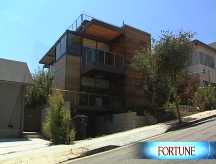When GE met Google
The industrial giant and Internet powerhouse team up to promote clean energy.
 |
| GE and Google will lobby federal legislators to build more power lines. |
(Fortune) -- When companies as savvy and as important as General Electric and Google join forces, it's worth a closer look. The companies say they will work together to drive two industries with big growth potential: geothermal energy and the upgrading of the nation's overburdened electricity grid.
The two industries are related, of course. Renewable energy, whether from wind, the sun or geothermal, which taps into the heat below the surface of the earth, won't be deployed on a vast scale until the electricity grid can carry more power and deliver it more intelligently.
A more robust grid, often called a smart grid, would be able to move electricity in both directions (not just from central power plants to users), monitor usage better, enable more sophisticated pricing schemes and use advanced sensors to pinpoint outages.
"The smart grid is all about marrying energy technology and information technology," said Bob Gilligan, a vice president for transmission and distribution at GE Energy (GE, Fortune 500), during a conference called Smart Grid this week in Washington, D.C. Without a stronger and smarter grid, the so-called clean tech revolution will come to a grinding halt.
"There are two challenges with renewables," Gilligan explained. "The first is that the places the wind blows and the sun shines tend to be deserts and mountains where people don't congregate." More transmission lines, he says, are needed to deliver electricity from rural areas to cities.
The second challenge, he says, is to find a way to enable consumers and businesses that generate their own renewable electricity to sell any surplus back to the grid. With a two-way grid, utilities could buy power from owners of small-scale solar panels or farmers who make electricity from biomass (i.e., manure).
"If you start thinking about small generation that is widely dispersed - like residential photovoltaic or biomass - the grid has to be able to see that generation and control it," Gilligan said.
All of this matters to GE and, more surprisingly, Google (GOOG, Fortune 500). GE sells transmission stations and electricity meters to utility companies, and the company is developing technology to convert waste heat from gas turbines into electricity that also has geothermal applications. GE's sizable wind turbine business also stands to gain from a more robust grid.
For its part, Google has invested tens of millions of dollars in a range of startup companies that are developing solar, wind, wave energy and advanced geothermal. Just as important, the company's data centers consume an enormous amount of electricity - just how much, the company won't say. "We would like cleaner options," said a Google spokeswoman.
Washington will be one focus of the GE-Google clean energy partnership. The companies haven't disclosed details of their arrangement, but said they will jointly advocate for a federal policy to upgrade the grid and build new transmission lines.
"If we're really going to move large amounts of electricity from the Dakotas to Chicago or from the Mojave to L.A., we've got to build more transmission lines," said Dan Reicher, director of climate change and energy initiatives at Google. "One of the critical things we've got to get done in Washington is put some federal muscle behind building transmission."
GE's Gilligan agrees, saying it can now take a decade or more to obtain permission to build a new transmission line.
The opportunities created by a smarter grid are even greater. Consider a simple idea called time-of-use electricity pricing. It costs utilities more money to generate power during the day, when demand peaks, because they call into services less efficient power plants or more expensive fuels. They'd like to smooth out the peaks by charging customers less for their electricity at night. With time-of-day pricing, customers would save money by running a dishwasher or washing machine at 10 p.m. instead of 10 a.m.
The problem is, today's electricity meters (and the utility's billing systems) aren't smart enough to know when each customer is using power.
Nor do most meters allow retail customers to sell, as well as buy, electricity. Google and other supporters of plug-in electric cars envision a world where car owners could buy electricity from the grid at night (when prices are lower), store it in their batteries and resell it (at higher prices) back to the grid during the day.
Says Reicher: "We're fully expecting that the Toyotas (TM) and General Motors (GM, Fortune 500) of the world will put plug-ins on the road in 2009 and 2010. The challenge is, how do they get integrated into the electric grid?"
Some of this may sound far-fetched, but it's not. All the technology needed to make the grid stronger or smarter is currently available. What's lacking, for the most part, are federal and state policies that would reward utility companies for upgrading as well as a stronger federal role in overriding local objections to new transmission lines.
By contrast, a good deal more research is needed to make geothermal energy - the other element of the GE-Google alliance - economical on a large scale. GE and Google say they will collaborate on geothermal energy, but they did not explain how.
Just last month, Google invested $10 million in advanced geothermal technology through its philanthropic arm Google.org. (Here's the announcement.) The technology has enormous potential because geothermal energy is plentiful and available throughout the United States and globally. But capturing it from as deep as six miles beneath the earth takes some doing, as this Google video shows. The company has invested in AltaRock Energy, which is seeking to lower the cost and improve the efficiency of geothermal projects, and Potter Drilling, a developer of deep hard-rock drilling technology.
Time will tell what the GE-Google alliance produces. But putting their brightest minds - and fat pocketbooks - together can only be good news for the planet. ![]()
-
 The retail giant tops the Fortune 500 for the second year in a row. Who else made the list? More
The retail giant tops the Fortune 500 for the second year in a row. Who else made the list? More -
 This group of companies is all about social networking to connect with their customers. More
This group of companies is all about social networking to connect with their customers. More -
 The fight over the cholesterol medication is keeping a generic version from hitting the market. More
The fight over the cholesterol medication is keeping a generic version from hitting the market. More -
 Bin Laden may be dead, but the terrorist group he led doesn't need his money. More
Bin Laden may be dead, but the terrorist group he led doesn't need his money. More -
 U.S. real estate might be a mess, but in other parts of the world, home prices are jumping. More
U.S. real estate might be a mess, but in other parts of the world, home prices are jumping. More -
 Libya's output is a fraction of global production, but it's crucial to the nation's economy. More
Libya's output is a fraction of global production, but it's crucial to the nation's economy. More -
 Once rates start to rise, things could get ugly fast for our neighbors to the north. More
Once rates start to rise, things could get ugly fast for our neighbors to the north. More









